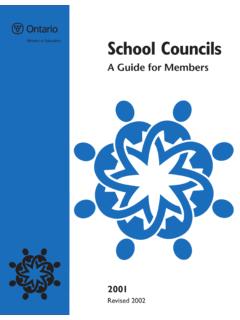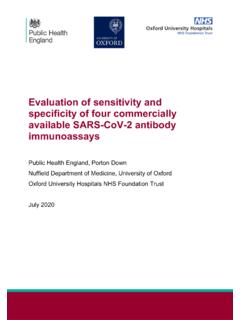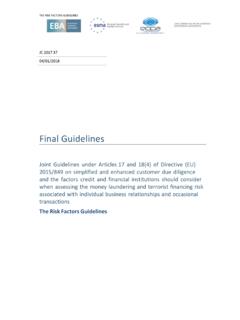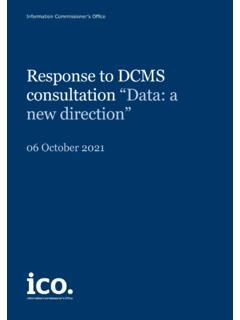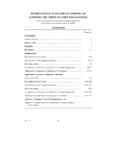Transcription of Charging for school activities - GOV.UK
1 Charging for school activities Departmental advice for governing bodies, school leaders, school staff and local authorities May 2018 2 Contents Summary 3 About this departmental advice 3 Expiry or review date 3 Who is this advice for? 3 Main points 3 school Charging 4 Education 4 Optional extras 5 Voluntary contributions 6 Music Tuition 6 Transport 7 Charging and remissions policies 7 Residential visits 8 Education partly during school hours 8 Non-residential activities 9 Residential visits 9 State boarding schools 9 Frequently asked questions 11 Further sources of information 17 Assocaited resources (external links) 17 Other departmental advice and statutory guidance you may be interested in 17 Other departmental resources 17 3 Summary About this departmental advice The purpose of this departmental advice is to help governing bodies, school leaders, school staff and local authorities set out their policies on Charging and remission for school activities and school visits.
2 Sections 449-462 of the Education Act 1996 sets out the law on Charging for school activities in schools maintained by local authorities in England. Academies (including free schools, studio schools and university technical colleges) are required through their funding agreements to comply with the law on Charging for school activities . This advice has been written to provide at-a-glance information and complements the information given in section of the Governors Handbook. This advice accurately reflects the terms of the Education Act 1996, but it is not a substitute for those terms. References within this advice to the role of the governing body should be taken to refer to the academy trust, in the case of academies. Expiry or review date This advice will be reviewed and updated as necessary. Who is this advice for? This guidance is for: school leaders, school staff and governing bodies in all maintained schools and academies Local authorities Main points school governing bodies and local authorities, subject to the limited exceptions referred to in this advice, cannot charge for education provided during school hours (including the supply of any materials, books, instruments or other equipment.)
3 Schools must ensure that they inform parents on low incomes and in receipt of the benefits listed on page 9 of this document of the support available to them when being asked for contributions towards the cost of school visits. 4 school Charging Education school governing bodies and local authorities, cannot charge for: an admission application to any state funded school - paragraph (n) of the school Admissions Code 2012 rules out requests for financial contributions as any part of the admissions process; education provided during school hours (including the supply of any materials, books, instruments or other equipment); education provided outside school hours if it is part of the national curriculum1, or part of a syllabus for a prescribed public examination that the pupil is being prepared for at the school , or part of religious education; instrumental or vocal tuition, for pupils learning individually or in groups, unless the tuition is provided at the request of the pupil s parent.
4 Entry for a prescribed public examination, if the pupil has been prepared for it at the school ; and examination re-sit(s) if the pupil is being prepared for the re-sit(s) at the school2. Schools and local authorities can charge for: any materials, books, instruments, or equipment, where the child s parent wishes him/her to own them; optional extras (see page below); music and vocal tuition, in limited circumstances (see page 6); certain early years provision3; community facilities4. 1 It should be noted that part of the national curriculum is not restricted to learning outside the classroom experiences that are specifically subject based ( geography or science fieldwork) and include, for example, activities designed to fulfil requirements under the national curriculum inclusion statement ( developing teamwork skills).
5 2 However, if a pupil fails, without good reason, to meet any examination requirement for a syllabus, the fee can be recovered from the pupil s parents. 3 The Education (Charges for Early Years Provision) Regulations 2012 4 The powers to provide community facilities are under (1) of the Education Act 5 Optional extras Charges may be made for some activities that are known as optional extras . Where an optional extra is being provided, a charge can be made for providing materials, books, instruments, or equipment. Optional extras are: education provided outside of school time that is not: a) part of the national curriculum; b) part of a syllabus for a prescribed public examination that the pupil is being prepared for at the school ; or c) part of religious education. examination entry fee(s) if the registered pupil has not been prepared for the examination(s) at the school ; transport (other than transport that is required to take the pupil to school or to other premises where the local authority/governing body have arranged for the pupil to be provided with education); board and lodging for a pupil on a residential visit; extended day services offered to pupils (for example breakfast club, after- school clubs, tea and supervised homework sessions).
6 In calculating the cost of optional extras an amount may be included in relation to: any materials, books, instruments, or equipment provided in connection with the optional extra; the cost of buildings and accommodation; non-teaching staff; teaching staff engaged under contracts for services purely to provide an optional extra, this includes supply teachers engaged specifically to provide the optional extra; and the cost, or an appropriate proportion of the costs, for teaching staff employed to provide tuition in playing a musical instrument, or vocal tuition, where the tuition is an optional extra. Any charge made in respect of individual pupils must not exceed the actual cost of providing the optional extra activity, divided equally by the number of pupils participating. It must not therefore include an element of subsidy for any other pupils wishing to participate in the activity whose parents are unwilling or unable to pay the full charge.
7 Furthermore in cases where a small proportion of the activity takes place during school hours the charge cannot include the cost of alternative provision for those pupils who do 6 not wish to participate. Therefore no charge can be made for supply teachers to cover for those teachers who are absent from school accompanying pupils on a residential visit. Participation in any optional extra activity will be on the basis of parental choice and a willingness to meet the charges. Parental agreement is therefore a necessary pre-requisite for the provision of an optional extra where charges will be made. Voluntary contributions Nothing in legislation prevents a school governing body or local authority from asking for voluntary contributions for the benefit of the school or any school activities . However, if the activity cannot be funded without voluntary contributions, the governing body or head teacher should make this clear to parents at the outset.
8 The governing body or head teacher must also make it clear to parents that there is no obligation to make any contribution. It is important to note that no child should be excluded from an activity simply because his or her parents are unwilling or unable to pay. If insufficient voluntary contributions are raised to fund a visit, or the school cannot fund it from some other source, then it must be cancelled. Schools must ensure that they make this clear to parents. If a parent is unwilling or unable to pay, their child must still be given an equal chance to go on the visit. Schools should make it clear to parents at the outset what their policy for allocating places on school visits will be. When making requests for voluntary contributions, parents must not be made to feel pressurised into paying as it is voluntary and not compulsory. Schools should avoid sending colour coded letters to parents as a reminder to make payments and direct debit or standing order mandates should not be sent to parents when requesting contributions.
9 Music Tuition Although the law states that, in general, all education provided during school hours must be free, instrumental and vocal music tuition is an exception to that rule. The Charges for Music Tuition (England) Regulations 2007 set out the circumstances in which charges can be made for tuition in playing a musical instrument, including vocal tuition. They allow Charging for tuition in larger groups than was previously the case. Charges may now be made for vocal or instrumental tuition provided either individually, or to groups of any size, provided that the tuition is provided at the request of the pupil s parent. Charges may not exceed the cost of the provision, including the cost of the staff who provide the tuition. 7 The regulations make clear that Charging may not be made if the teaching is either an essential part of the national curriculum, or is provided under the first access to the key stage 2 Instrumental and Vocal Tuition Programme.
10 They also make clear that no charge may be made in respect of a pupil who is looked after by a local authority (within the meaning of section 22(l) of the Children Act 1989). Transport Schools cannot charge for: transporting registered pupils to or from the school premises, where the local education authority has a statutory obligation to provide transport; transporting registered pupils to other premises where the governing body or local authority has arranged for pupils to be educated; transport that enables a pupil to meet an examination requirement when he has been prepared for that examination at the school ; and transport provided in connection with an educational visit. Guidance on school travel is available here: Charging and remissions policies No charges can be made unless the governing body of the school or local authority has drawn up a Charging policy giving details of the optional extras or board and lodging that they intend to charge for, and a remissions policy.











